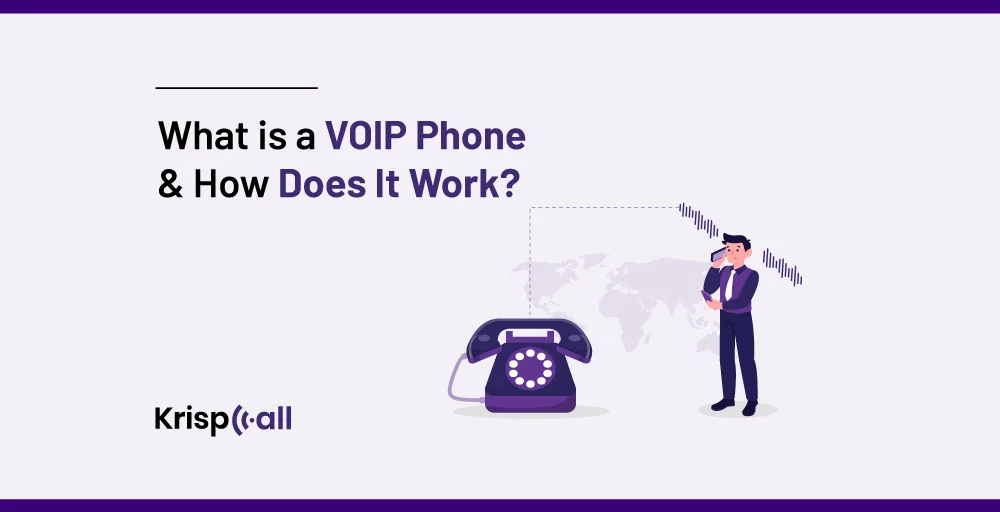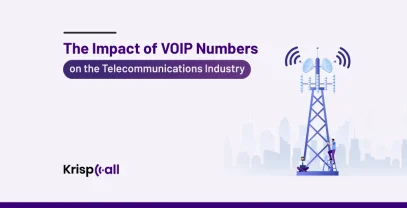In this age of innovation, new technologies are being introduced and used by many organizations to improve their communication services. One innovation that has made its mark in the communication sector is the introduction of VoIP phones. 📱
VoIP phones have significantly transformed the communication sector, offering numerous benefits and reshaping the way we communicate.
For a business to be successful, using technologies like VoIP phones is essential to staying ahead of its competitors. The business must also fully understand how they work. 🛠️
In this blog, you’ll learn what is a VoIP phone, its uses and benefits, which will help you transform your business communication from a traditional phone system to a VoIP phone system.
🔑 KEY HIGHLIGHTS
- VoIP phones are business phones that use software or hardware to make and receive calls over IP networks using VoIP technologies.
- VoIP phones convert analog voice signals into digital data that can be transmitted over the internet.
- Wired phones and softphones are the types of VoIP phones.
- Some of the most popular VoIP phones are the Yealink T54W, Yealink T46U, Polycom VVX 450, and Fanvil X3SG.
- Some popular VoIP conference phones are Poly Trio 8300, Snom MeetingPoint, Cisco 8832, and Dolby.
- KrispCall is a feature-rich VoIP phone system that provides excellent voice calls at a reasonable cost.
What is a VoIP Phone?
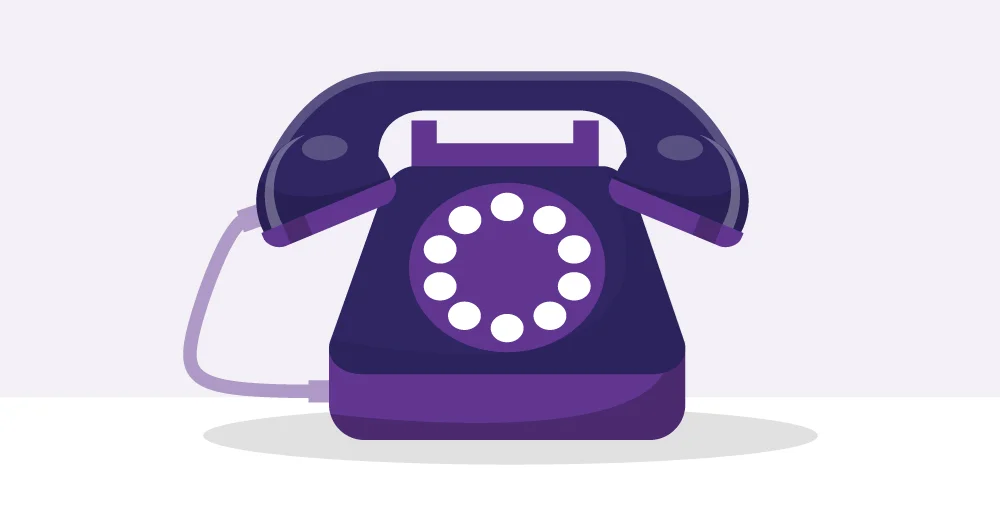
A VoIP phone is a business phone that uses software or hardware to make and receive calls over IP networks using VoIP technologies. It can convert incoming digital phone signals from the Internet to normal telephone audio or transform analog telephone audio into a digital format that can be broadcast over the Internet.
A VoIP phone includes features like call queuing, auto-dialer, voicemail transcription, global calling, shared phone numbers, etc., that are not found in traditional analog phones. These features help to make communication more flexible and efficient, making VoIP phones an ideal choice for any business.
What is VoIP Phone Used for?
A VoIP phone is used for different purposes by different organizations according to their needs. Some businesses use them because they don’t have the proper infrastructure for traditional landline phones. Some want to replace their traditional phone lines due to the additional time and cost involved in installation and maintenance.
Other businesses, like customer service, may use VoIP phones to reach more customers by picking a number with an area code where the customer is located. These numbers, with different area codes aligned with customers’ geographical location, convince them to pick up phone calls.
Also, businesses can use VoIP phones to share their phone number across multiple devices, like desktops, laptops, tablets, or mobile phones, because different team members may use different devices. This is easily done through VoIP phones as VoIP supports this feature. Additionally, businesses can integrate a voice API with their VoIP phones to enable advanced features such as automated voice responses and seamless connectivity across various applications.
VoIP Vs Traditional Phone Systems: What is the Difference?
If you are trying to distinguish VoIP from traditional phone systems, you must understand that the main difference between them is that they have different modes of transmission.
VoIP converts analog signals to digital signals to transmit them through the internet. However, traditional phone systems use physical copper wires to transmit analog signals. Another difference between them is VoIP is more scalable and flexible than traditional phones. Also, VoIP requires low cost and maintenance to install and maintain it respectively.
The following table shows you VoIP vs traditional phone systems:
| Feature | VoIP | Traditional Phone |
| Mode of Transmission | Converts voice to digital data transmitted over broadband internet | Uses physical copper lines to transmit analog data |
| Cost | Lower cost, no hardware requirements | Higher cost, hardware requirements |
| Scalability | Scalable, easy to add or remove users | Limited scalability, requires hardware upgrades |
| Flexibility | Flexible, it can be used from anywhere with an internet connection | Limited flexibility tied to physical location |
| Maintenance | Low maintenance, no hardware issues | High-maintenance hardware issues are common |
| Features | Offers advanced features like video calling, screen sharing, and instant messaging | Limited features, mainly voice calling and voicemail |
| Integrations (CRM, business tools) | Available | Not Available |
| Hardware Requirements | No hardware requirements, uses internet connection | Requires hardware installation at customer locations |
How Does VoIP Phone Work?
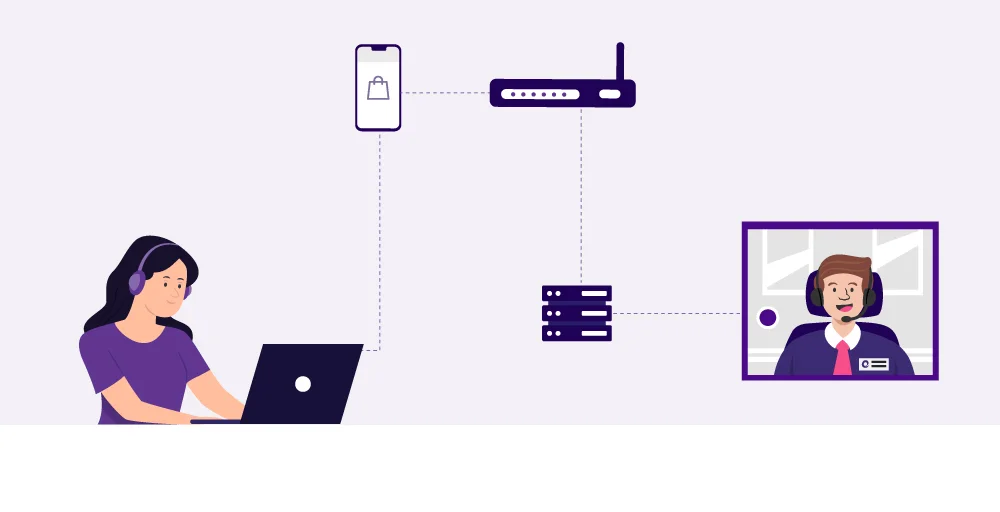
VoIP phones work by converting analog voice signals into digital data that can be transmitted over the internet. Here’s a step-by-step explanation:
- Analog Voice Signal: When you use a VoIP phone, the sound of your voice is first converted from a digital format into an analog audio signal.
- Digital Conversion: The analog voice signal is then converted into digital data through a process known as Pulse Code Modulation (PCM). This digitization allows the voice data to be transmitted over the internet.
- Packetization: Then, the digitized voice data is divided into smaller chunks or packets, each containing a segment of the original voice signal.
- Internet Transmission: The individual packets of digital voice data are then transmitted over the internet to the servers of the VoIP service provider.
- Decompression and Reconstruction: Once the digital voice packets reach the VoIP provider’s servers, the servers decompress and reassemble the packets back into the original analog voice signal.
- Call Connection: The reassembled analog voice signal is then routed to the recipient’s phone, enabling them to hear the original voice.
- Call Termination: When the call terminates, the process is reversed. The digital packets are sent back to the VoIP provider’s servers, where they are decompressed and reconstructed back into the original analog voice signal.
Benefits Of VoIP Phone Systems
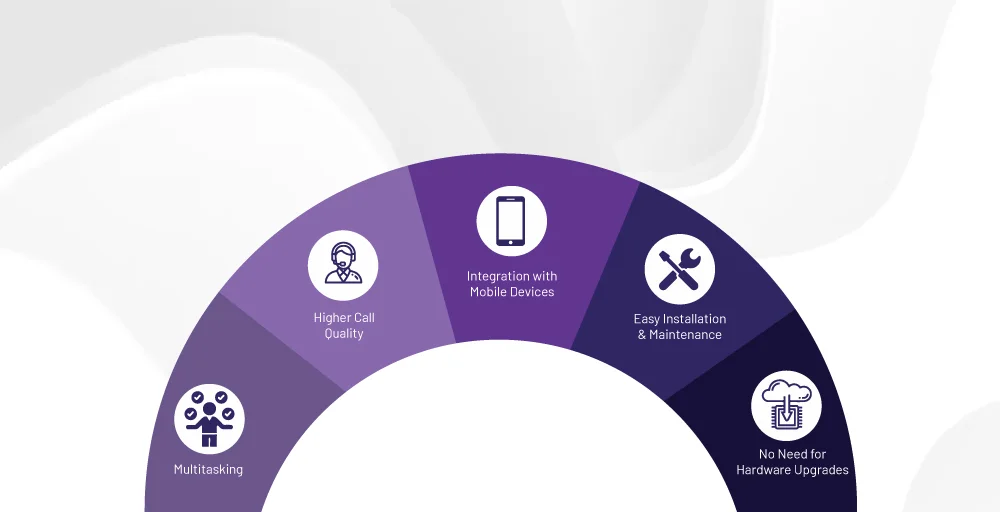
A VoIP phone system is essential for any modern organization trying to meet its increasing business goals. A VoIP phone system can provide a major competitive advantage to your business by meeting these goals. The following are some ways that a VoIP phone system can benefit your company:
- Multitasking: With the VoIP phone system, you can send information such as photos, videos, and documents simultaneously when communicating with someone. This makes it really easy to multitask and share information during a conversation. It allows for more seamless collaboration and information sharing, which can be really helpful in a business setting.
- Higher Call Quality: Compared to traditional phones, VoIP phones have better call quality. The sound is much crisper and clearer. VoIP uses “HD voice” technology to deliver high-definition audio. This improved call quality makes a big difference, especially for important business calls or conversations with customers.
- Integration with Mobile Devices: You can easily use the VoIP phone system on your mobile device. This means that rather than being restricted to your office desk, you can make and answer calls on your smartphone or tablet so that you’re not tied to any one place. This makes it super convenient to work remotely or travel for business.
- Easy Installation and Maintenance: Setting up a VoIP phone system is easy nowadays. Setting up is made really straightforward by the companies offering these services. They also ensure the VoIP phone system functions properly and has good call quality. They do this by monitoring the system backend and catching and correcting any issues.
- No Need for Hardware Upgrades: With VoIP phone systems, you don’t have to worry about constantly upgrading or replacing expensive equipment, as with traditional phone lines. That’s because the VoIP providers handle all the technology upgrades automatically, without you having to do anything. In the long run, this saves you a lot of money because you don’t constantly have to invest in new equipment.
Types Of VoIP Phones
There are two different types of VoIP phones: Softphones and Wired phones. Businesses can choose each type of phone according to their requirements and goals.
1. Wired Phones
Wired phones are desk phones that look like traditional landline phones, but they use Voice over Internet Protocol (VoIP) technology to make calls over an Internet Protocol (IP) network. They are usually connected to the Internet via an Ethernet cable and thereby convert analog voice signals into digital data that can be transmitted over the Internet. Examples of these kinds of VoIP phones are the Yealink T54W and the Polycom VVX 450.
2. Softphones
Softphones are virtual phone applications installed on computers, tablets, or smartphones. They act as software-based phone clients and offer features similar to regular hardware phones, such as voicemail, call transfer, and conference calls. Skype and Google Voice are some examples of softphones.
Top VoIP Phones to Consider
There are different VoIP phone models that you can use for your business. However, choosing the best model that fulfills your requirements is difficult. Therefore, the following list of top VoIP phone models will help you choose the model that fits your business.
1. Yealink T54W
The Yealink T54W is a high-end IP phone designed for busy executives and professionals. It features a 4.3-inch color LCD display, support for up to 16 VoIP accounts, advanced audio quality with various codecs, and Bluetooth connectivity. The phone supports advanced features like call recording, forwarding, and transfer, making it ideal for conference calls and other group communication scenarios.
Pricing: $89.95
2. Yealink T46U
The Yealink T46U is an IP phone with 16 SIP accounts, 2 USB-A ports, and various codecs for high-quality audio. It also has PoE (self-powered via Ethernet cable) and is expandable with optional dongles.
Pricing: $185.99
3. Polycom VVX 450
The Polycom VVX 450 is an IP phone with 12 lines, a 4.3-inch color LCD screen, and support for various codecs for high-quality audio. It also has PoE (self-powered via Ethernet cable) and a large screen for easy navigation. However, the screen size is relatively small compared to other models.
Pricing: $264.90
4. Fanvil X3SG
The Fanvil X3SG is an IP phone with 1000 recordable contacts, an adjustable color display, and various codecs for high-quality audio. It also has PoE (self-powered via Ethernet cable) and is compatible with hearing aids.
Pricing: $105.06
5. Polycom VVX 250
The Polycom VVX 250 IP phone has Poly HD Voice and Acoustic Fence technologies for high-quality audio, a 2.4-inch screen, and supports various codecs. It also has an intuitive interface and PoE (self-powered via Ethernet cable).
Pricing: $264.90
Top VoIP Conference Phones to Consider
All the top VoIP conference phones that you need for your businesses are listed below:
1. Poly Trio 8300
The Poly Trio 8300 is a conference phone with Wi-Fi and Bluetooth capabilities that supports over 60 communication platforms. It features a monochrome display, HD audio, and a full-duplex speakerphone with echo reduction. It is suitable for small conference rooms.
Pricing: $540 or $19.90 per month.
2. Snom MeetingPoint Conference Phone
The Snom MeetingPoint Conference Phone is designed for medium—to large-sized meeting rooms. It can accommodate up to five parties and offers advanced conferencing capabilities for larger gatherings.
Pricing: £768.00, with a refurbished option available for £640.00.
3. Cisco 8832 IP Conference Phone
The Cisco 8832 IP Conference Phone is designed for professional conferencing in medium to large meeting rooms. It offers high-quality audio and 360-degree coverage. It features a sleek design with a color LCD display and supports the SIP protocol. It is a suitable option for businesses seeking reliable conferencing solutions.
Pricing: £900.00 or £750.00
4. Yealink CP930W-Base Wireless DECT Conference Phone
Yealink CP930W-Base Wireless DECT Conference Phone offers high-quality audio for conference calls, with the ability to expand the system as needed. It utilizes DECT technology for reliable wireless connectivity and is suitable for small to medium-sized meeting rooms.
Pricing: £420.00, with a more affordable refurbished option available for £350.00.
5. Dolby Conference Phone
The Dolby Conference Phone provides exceptional audio quality with Dolby technology, ensuring crystal-clear conversations. It features a touchscreen interface for easy navigation and can be expanded to accommodate larger meeting rooms. It is a premium choice for businesses seeking high-quality conferencing solutions.
Pricing: £1,530.00, with a refurbished option available for £1,275.00.
Things to Consider Before Choosing a VoIP Phone for Your Business
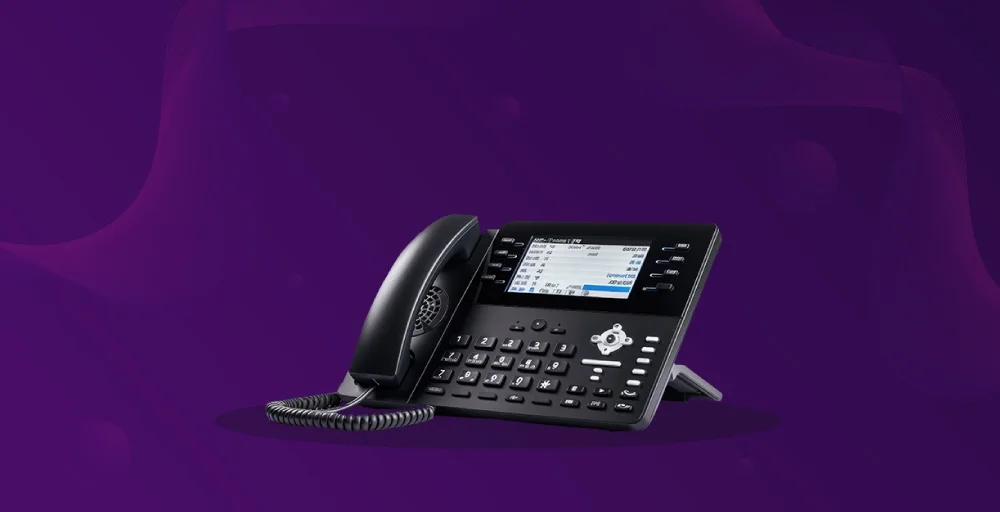
When choosing a VoIP phone for your business, there are several key factors you should consider:
- Understanding Your Business Needs: Before choosing the right VoIP phone system, make sure to understand what your company requires. Determine your business’s call volume, the features your business requires (for instance, call forwarding, voice mail, and conferencing), and the systems’ compatibility. You must consider services like live chat support or call monitoring, among others, if they are actually necessary for your organization.
- Cost and Capability: When choosing a VoIP phone, consider the cost of implementing network improvements and purchasing hardware that comes with it. You must also compare the subscription plan, per-user fees, and additional costs for extra features of different providers. You must allocate your budget as well as ensure that the chosen system has the required features while conforming to a particular budget.
- Scalability and Future-Proofing: Choose a system that can grow with you in terms of functionality, cost, and support. This will allow you to add more lines and features easily whenever required as you expand your business without needing additional hardware purchases. You shouldn’t consider systems that will force you to change providers later when you need high-level integration functionalities.
- Security and Reliability: You can look at the past history of the security measures taken by the VoIP service, which include encryption, access limitations, and disaster recovery plans. Ensure that network availability and call quality meet your company’s requirements. To protect sensitive information, the provider must comply with applicable laws such as GDPR or HIPAA.
- Customer Support and User Experience: When you get a new VoIP phone system for your business, you’ll want to ensure the system installation and configuration are smooth and straightforward. Also, ensure the VoIP provider has proper training resources to help you understand the new features. It’s also important that the VoIP system itself is easy to use. If anyone has issues, the provider should offer ongoing technical support.
Upgrade To KrispCall’s VoIP Phone System: Super Affordable, Flexible, And Feature-rich
There are several VoIP phone system providers that provide you with a VoIP phone system. Among them, KrispCall is one of the best providers of the VoIP phone system.
KrispCall is a super affordable, flexible, and feature-rich VoIP phone system that provides excellent voice calls at a reasonable cost. It also integrates with numerous business tools and CRM like Pipedrive, HubSpot, Zapier, Nimble, and many more.
Likewise, KrispCall provides various features including unified callbox, call barging, call whispering, call tree, call transfer, shared phone number, and many more.
Conclusion
Understand that a VoIP phone is just a business phone that uses software or hardware to convert analog signals to digital data and transmit it through the Internet. Businesses use VoIP phones to replace their traditional phone infrastructure. Replacing them with VoIP phone systems allows businesses to enjoy features like call queuing, auto-dialer, voicemail transcription, global calling, shared phone numbers, and more.
When choosing a VoIP phone for your business, consider factors like understanding your business needs, cost, scalability, security, reliability, customer support, and user experience. Moreover, the best choice for you is KrispCall, a feature-rich VoIP phone system that provides excellent voice calls at a reasonable cost.
FAQs
Are VoIP phones safe?
Yes, VoIP phones are safe. However, you need to take proactive measures to mitigate risks, such as using strong passwords and keeping VoIP phones and software up-to-date.
Can I use a VoIP phone as a regular phone?
Yes, you can use a VoIP phone as a regular phone. VoIP phones work similarly to traditional phones, but instead of connecting through a telephone line, they use the internet to make and receive calls.
Do VoIP phones use Wi-Fi?
Yes, VoIP phones use Wi-FI to make and receive calls rather than a wired ethernet connection.
How much does a VoIP phone service cost?
A basic VoIP phone service costs around $10 to $50 per user per month, depending on the service providers.
What is the difference between VoIP phones and mobile phones?
The difference between VoIP phones and mobile phones is that VoIP phones use the internet to make calls, while mobile phones rely on cellular networks.
Can a VoIP phone receive text messages?
Yes, a VoIP phone can receive text messages. VoIP phones can be text-enabled, allowing users to send and receive text messages using their VoIP numbers.
Can I transfer my phone number to VoIP?
Yes, you can transfer your phone number to VoIP. VoIP providers allow you to port your existing phone number from another provider to their service.
What are VoIP ports?
VoIP ports are computer ports that enable VoIP services to operate effectively. They facilitate the transmission and receipt of VoIP calls by connecting hardware, transmitting data, listening for incoming messages, and managing various VoIP services.

